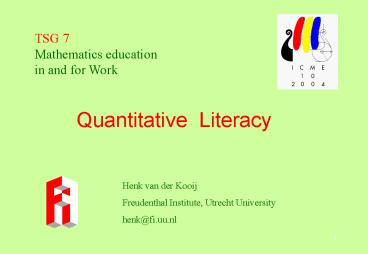Quantitative Literacy - PowerPoint PPT Presentation
1 / 26
Title:
Quantitative Literacy
Description:
Lynn Arthur Steen (USA) 2 exists in this world as a real object ... Elements of Quantitative Literacy (Steen, 2000): Practical Skills. Confidence with Mathematics ... – PowerPoint PPT presentation
Number of Views:126
Avg rating:3.0/5.0
Title: Quantitative Literacy
1
Quantitative Literacy
TSG 7 Mathematics education in and for Work
Henk van der Kooij Freudenthal Institute, Utrecht
University henk_at_fi.uu.nl
2
Mathematical Literacy(PISA, OECD, 1999)
an individuals capacity to identify and
understand the role that mathematics plays in the
world, to make well-founded mathematical
judgements and to engage in mathematics, in ways
that meet the needs of that individuals current
and future life as a constructive, concerned and
reflective citizen
3
OECD/PISA Framework for Assessment of
mathematical literacy
Mathematical Competencies (Skills)
- Math thinking and reasoning
- Math argumentation
- Modeling
- Problem posing and solving
- Representation
- Symbolic, formal and technical skill
- Communication
- Aids and tools
4
PISA Competency Classes
- Class 1 Reproduction, definitions,
computations - Class 2 Connections and Integration for
problem solving - Class 3 Mathematical thinking, generalization
and insight
5
PISA Assess Overarching Math Concepts rather
than Math Contents
- Quantity
- Space and Shape
- Change and Relationships
- Uncertainty
6
Lynn Arthur Steen (USA)
School Mathematics
Elementary use of sophisticated mathematics
Models and continuous functions
?2 exists in this world as a real object
Mathematics at Work
Sophisticated use of elementary mathematics
Discrete data and measurements Data analysis
?2 in this world is an operation not yet
finishedgiven the tolerance it will be 1.4
7
School math reflects aPlatonic World of ideal
objects (like numbers, quantities and shapes,
precisely defined and thus amenable to logically
precise relations known as theoremes.
Work math deals withreal, measured quantities
that are never perfectly precise. The data are
thus asking for interpretation, drawing
inferences, logical thinking, looking for
patterns, uncertainty,
8
In school, mathematics is well organized a
coherent sequence of topics (arithmetic, algebra,
geometry, trigonometry, functions, calculus)
going from 'simple' to 'advanced', systematically
building on concepts previously learned. Outside
school, problems in which mathematical expertise
is helpful, do not come with course labels
attached, but in categories.Modern Workplaces ask
for- 'basic' skills arithmetic, estimation,
graphs and charts,logical thinking,
understanding chance- 'thinking' skills
evaluating alternatives, making decisions,
solving problems, reasoning, organizing, planning
9
- Elements of Quantitative Literacy (Steen, 2000)
- Practical Skills
- Confidence with Mathematics
- Number Sense
- Mathematics in Context
- Prerequisite Knowledge
- Interpreting Data
- Making Decisions
- Symbol Sense
- Logical Thinking
10
Important Topics for Engineering
- Proportionality, both direct and inverse
- Numbers are mostly not precise!!
- Reading and interpreting complex graphs
- Logarithmic Scales
- Relationships between more than two variables
- Dimensions and Units
11
Find the relationship between b, f and the
entries d of the table
f
b
12
Lathe v p n d
rotational
n
(rpm)
speed
640
1280
2560
cutting
640
315
speed
(m/s)
v
160
320
80
160
40
80
20
40
10
20
10
10
20
40
80
160
320
640
diameter
(mm)
d
13
(No Transcript)
14
(No Transcript)
15
(No Transcript)
16
(No Transcript)
17
An item in a cafetaria costs 34 DK. A client pays
with a 100 DK bill. What mathematics should the
cashier use to find the right amount of money to
give back?
Not 100 - 34 66
But 34 1 5 10 50 100
Or 34 2 2 2 20 20 20 100
18
Two Statements for discussion
1 In vocational courses (preparatory and in
work) the discipline math should not define the
program, but the context of work defines the
necessary mathematical activities 2 abstraction
and formalism are no goals situated abstraction
and 'mathematics in context' are
19
(No Transcript)
20
Quantitative Literacyfor the Workplace
- Flexible use of appropriate mathematical methods
- Problem Solving and - Posing attitude
- Structuring and Organizing activities
- Confidence in handling information (data)
- Appropriate use of ICT - tools
21
Vocational Education Policy in Europe
- Until now Qualifications for the workplace
were described in terms of factual knowledge, on
a very detailed level - New policy in Holland (to be implemented in
2005)Qualifications for the workplace are
described in terms of (very general) broad
competencies, related to core problems of the
profession
22
Broad Professional Qualification (ACOA)
- Description of product, process and task in
mutual coherence, in order to be able to carry
out the occupational tasks in an efficient way - Development of methodical competencies (planning,
problem solving) should be emphasized more than
the concrete ways (task, instrument, knowledge,
method) that are used at present to tackle
problems
23
Key problems and Broad Occupational Competencies
Technical Cs
Product
ion
problems
Regulation
Co
-
operation
Methodical
Social
-
problems
problems
Cs
Co
-
operative
Cs
Organisational
Membership
Community
problems
problems
problems
Organisational Cs
Strategic Cs
Social
-
normative Cs
Source Onstenk, (1997)
24
Competency Based Education Defines new goals
for vocational education.It doesn't say anything
about how to achieve these goals Problem Based
Education One of the new learning environments
to achieve the new goals Work place-like settings
with complex tasks simulations or real work
25
Big Problems for mathematics!! 1. Mathematics is
taught/learned in a linear way. But in PBE, at
least the mathematical concept and some way of
use in a qualitative and quantitative way is
needed from the very beginning 2. Designers of
the complex tasks don't see any mathematics. It
is just straightforward production.How to deal
with this?
26
Jim Ridgway (GB)
- competencies learned from a broad based education
generalise to practical work aquisition of
mathematical techniques does not. - mathematical technique is not a 'foundation' but
rather is just a component of math education - mathematics education should encourage the
development of a broad range of skills, and some
successful application of technique - deployment of skills in range of contexts should
be encouraged































